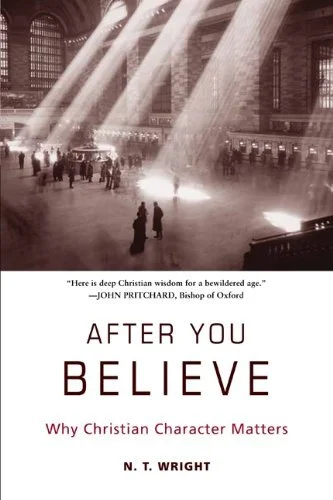After You Believe
In After You Believe: Why Christian Character Matters, N.T. Wright lays out his understanding of how Christian character, or virtue, is formed. While none of us are naturally inclined to live like Jesus, the goal is that as we mature as Christ-ians, we begin to look more and more like the one with whom we identify. Living like Jesus, then, may even seem to be “second nature” eventually. Like his other books, Wright doesn’t exactly put the cookies on a low shelf, though compared with some of his other works (like the ones in this series), he’s sure trying.
There’s simply too much packed into these 300 pages to try to unpack everything here, but here are a few particularly great quotes from the later part of the book, as the vision of Christian character he weaves begins to take shape. (And for those disposed to view Wright with suspicion, he stays away from controversy here — at least as far as I can tell.)
On what it means to be the people of God:
The task of being God’s royal priesthood in the present, then, is all about worship and mission — a worship and mission which share a heart, the heart that is learning to love God the creator and God the recreator and discovering how to develop the habits that will reflect God’s love into the world and the world’s grateful love back in return… The generous creator God is not honored, is not reflected into his world, by a church that stands aloof, secure in its own holiness, and looking down on the best that the rest of the world can do as so much unspiritual, un-Christian or ungodly rubbish… Precisely because the greatest Christian virtue is love, modeled on that of the creating and life-giving God, the individual Christian and the church as a whole must develop the settled habits of looking out for what’s going on in the surrounding world, rejoicing with its joy, weeping with its grief, and above all eager for opportunities to bring love, comfort, healing, and hope wherever possible. And with all these it may bring faith, not necessarily by speaking of Jesus all the time (though there will be such opportunities), but by living Jesus in public. (pp. 234-235, 237)
On unbiblical (and counter-productive) divides within the church:
The church has been divided between those who cultivate their own personal holiness but do nothing about working for justice in the world and those who are passionate for justice but regard personal holiness as an unnecessary distraction from that task. This division has been solidified by the church’s unfortunate habit of adopting from our surrounding culture the unhelpful packages of ‘left-wing’ and ‘right-wing’ prejudices, the former speaking of ‘justice’ and meaning ‘libertarianism’ and the latter speaking of ‘holiness’ and meaning ‘dualism.’ All this must be firmly pushed to one side. What we need is integration. (p. 247)
How our individual formation of Christian character and virtue is connected to other believers across time and space:
The more we are people of the story, the examples, the community, and the practices, the more we will understand the scriptures, and vice versa. And the more we join them all together, the more we shall be formed into a community, locally, globally, and across time, in whose lives the Jesus habits of faith, hope, and love have become second nature. (pp. 283-284)
Thoughts? Responses?
